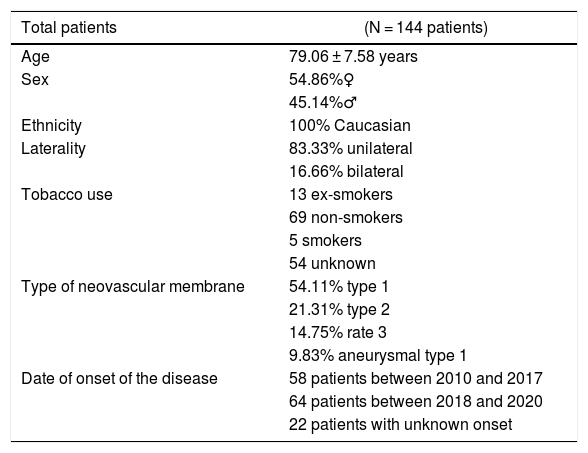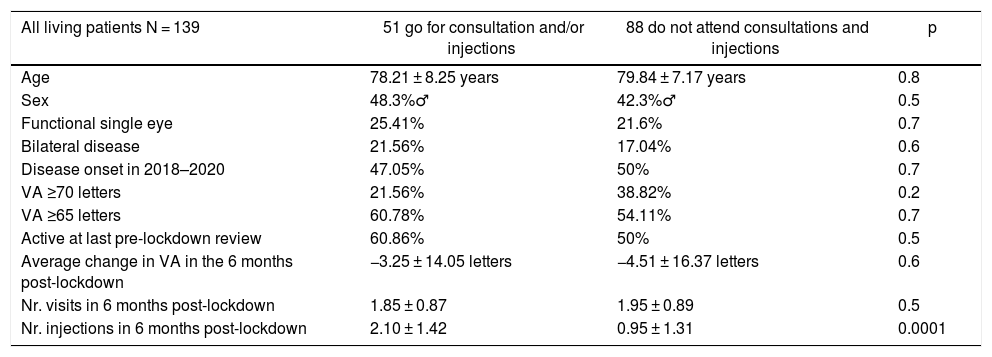The SARS-CoV-2 pandemic has caused chaos in all health systems on the planet. It has been difficult to cope with COVID 19, but also to maintain the activity in other specialties. In ophthalmology, the scientific societies recommended providing urgent care, including the intravitreal treatment of patients with active neovascular age-related macular degeneration (AMD), since a delay in treatment implies a potential loss of visual acuity (VA).
The main objective of this study was to measure the impact of the coronavirus lockdown on the activity and visual results in patients with neovascular AMD in Area 3 of Madrid.
Material and methodA retrospective observational study was conducted of all patients with neovascular AMD who attended a consultation and/or received intravitreal treatment in the 3 months before the lockdown.
ResultsIn the 3 months before the lockdown, 144 patients with neovascular AMD were treated, of whom only 51 attended a consultation during the lockdown and, at 6 months after it, only 117 patients had resumed their follow-up. Mean VA before the lockdown was 58.0 ± 23.7 letters and was statistically significantly reduced to 53.0 ± 27.1 letters at 6 months after the lockdown. We also observed a significant decrease in the number of visits during the lockdown, despite the security measures implemented.
ConclusionsOur study shows that patients with neovascular AMD have had a statistically significant decrease in VA due to the lockdown. A VA of almost 58 letters was reduced to 53 at 6 months after the lockdown. The percentage of patients who lost 15 or more letters doubled. We observed a 63.3% loss of temporary follow-up during the lockdown and a 14.58% loss of permanent follow-up at 6 months after the lockdown.
La pandemia SARS-CoV-2 ha supuesto un caos organizativo para todos los sistemas sanitarios del planeta. No solo ha sido complicado hacer frente a la COVID 19, sino también ajustar la actividad asistencial en otras especialidades. En oftalmología las recomendaciones de las sociedades científicas eran dar asistencia urgente y dentro de esta se contemplaba el tratamiento intravítreo de los pacientes con degeneración macular asociada a la edad neovascular (DMAEn) activa, puesto que el retraso en el tratamiento supone una pérdida potencialmente irrecuperable de agudeza visual (AV).
El objetivo primario del presente estudio es medir el impacto en la actividad y los resultados visuales del confinamiento por coronavirus en los pacientes con DMAEn en el área 3 de la Comunidad de Madrid.
Material y métodoSe plantea un estudio observacional retrospectivo de todos los pacientes con DMAEn que habían acudido a consulta y/o recibido tratamiento intravítreo los 3 meses previos al inicio del confinamiento.
ResultadosLos 3 meses previos al confinamiento se atendieron a 144 pacientes con DMAEn de los cuales solo 51 acudieron durante el confinamiento y a los 6 meses tras el confinamiento solo 117 pacientes han retomado su seguimiento. La AV media antes del confinamiento era de 58 ± 23,7 letras y se redujo de forma estadísticamente significativa a 53 ± 27,1 letras a los 6 meses tras el confinamiento. También observamos una disminución significativa del número de visitas durante el confinamiento a pesar de las medidas de seguridad implementadas.
ConclusionesNuestro estudio demuestra que los pacientes con DMAEn presentan una disminución estadísticamente significativa de la AV durante el confinamiento. De una AV de casi 58 letras, se redujo a 53 a los 6 meses del confinamiento. El porcentaje de pacientes que perdió 15 o más letras se duplicó. Observamos un 63,3% de pérdida de seguimiento temporal durante el confinamiento y un 14,6% de pérdida de seguimiento permanente a los 6 meses tras el confinamiento.
Artículo
Comprando el artículo el PDF del mismo podrá ser descargado
Precio 19,34 €
Comprar ahora











